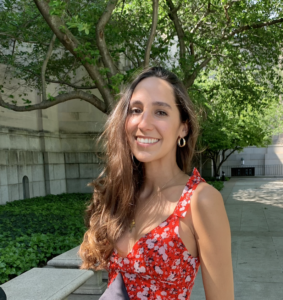
Felicitas Brugo, Education Outreach Coordinator, USCCB/MRS
Beginning in the Diocese of Milan, Italy in 1983, Radio Maria was focused on providing information to their parishioners and prayer through daily mass, the rosary holy hours and more. Soon, the show gained much traffic, and the World Family of Radio Maria began in 1998, and now includes 77 stations globally. Radio Maria’s is a radio show that is a non-profit, entirely volunteer-based, with local funds from listeners that is a voice through the Roman Catholic Church and is accessible worldwide to network with all Catholics’ both nationally and internationally.
Radio Maria’s show, called “Rompiendo Las Aguas,” is Spanish language radio show that hosted Felicitas Brugo Onetti, USCCB/MRS’s Anti-Trafficking Education and Outreach Coordinator Here she discussed the sin of human trafficking, current trends, along with the story of St. Josephine Bakhita and what her role is as the Patron Saint for Victims of Trafficking. The conversation discussed terminology, the struggles of victims and survivors, and the different categories of human trafficking trafficking (e.g. labor).
Of particular importance was in her sharing of the story of St. Josephine Bakhita, who was enslaved for most of her childhood, and who found both God and forgiveness through her suffering. St. Josephine witnessed the evil humans can do to one another, and through strength and God’s protection, she was set free, and continues to be an icon of freedom, love, suffering, and forgiveness. In highlighting St. Josephine’s story, we can find comfort in God’s protection, and victims can seek refuge in St. Josephine’s prayer of love, suffering, and forgiveness.
USCCB Programs:
1. Become a Shepherd: Stop Human Trafficking and Exploitation. Protect, Help, Empower, and Restore Dignity (SHEPHERD) educates lay and religious leaders about human trafficking from a Catholic perspective, equipping them with needed knowledge and skills to combat forced labor and commercial sexual exploitation at the local level.
2. Amistad Movement: Like the captives aboard the Amistad slave ship who revolted and won their freedom, the Amistad Movement seeks to empower immigrants in at risk communities with the educational tools to protect their own community members from falling victim to human trafficking.
3. Coalition of Organizations and Ministries Promoting the Abolition of Slavery at Sea (COMPASS): Maritime trafficking is modern slavery at sea, a violation of the human dignity of laborers at all stages of the seafood supply chain and aquaculture industries. The virtually unregulated fishing industry in many countries, coupled with the global demand for cheap seafood, create the lawless conditions under which trafficking at sea flourishes.
4. Bridging Refugee Youth and Children Services (BRYCS): Recognizing that survivors of trafficking have unique vulnerabilities and require specialized treatment and care, BRYCS works closely with the U.S. Conference of Catholic Bishops’ department of Migration and Refugee Services (USCCB/MRS) to support its mission of providing outreach, education, services, and advocacy on behalf of all victims of trafficking.
